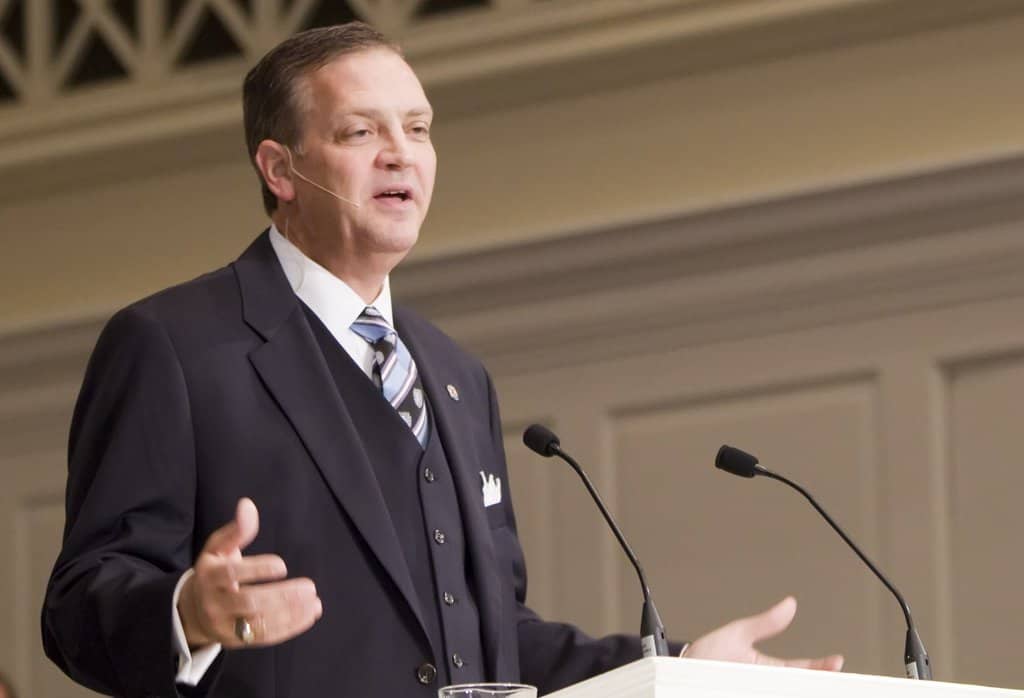James A. Smith Sr./Baptist Press
PROVO, Utah (BP) – Speaking for the second time in less than 100 days at Brigham Young University (BYU), Southern Baptist leader R. Albert Mohler Jr. told students and faculty at the school, “We may go to jail sooner even than we thought,” recalling his concern about the threat to religious liberty raised in an earlier appearance at the Mormon-owned school.
“I am not here because I believe we are going to heaven together, but I do believe we may go to jail together,” said Mohler, president of The Southern Baptist Theological Seminary, during his first visit Oct. 21 to the Latter Day Saints’ premier educational institution, named for Mormonism’s second president.
Delivering the Feb. 25 Forum Lecture about human dignity, human rights and human flourishing at the Marriott Arena on the BYU campus, Mohler revisited the concerns of his October speech in which he called on Mormons and evangelicals to work together in defense of religious freedom, while recognizing serious theological differences between the faiths. Mohler addressed 2,731 faculty and students at the BYU forum, according to Deseret News.
Since the October address, “so much has changed,” Mohler said, noting federal courts have ruled against Utah’s prohibitions against polygamy and gay marriage and the president of the Latter-day Saints (LDS) church has been “summoned to appear in a secular court in London.”
Like the October address, Mohler frankly outlined theological differences between evangelicals and Mormons, while also calling for collaboration for the sake of religious freedom in America.
“This is why our conversation is really important, and why we need to stand together on so many urgent concerns,” he said. “Most importantly, we are now called to defend religious liberty for each other, so that when they come for you, we are there, and when they come for us, you are there. We are learning anew what the affirmation of religious liberty will demand of us in this dangerous age.”
Mohler noted he was invited and came to the BYU lecture as president of a Southern Baptist seminary and evangelical Christian “committed to the gospel of Jesus Christ and to the trinitarian beliefs of the historic Christian faith. I come as one who does not share your theology and who has long been involved in urgent discussions about the distinctions between the faith of the Latter Day Saints and the faith of the historic Christian church.”
Mormons and evangelicals “need to talk. We can and must take the risk of responsible, respectful and honest conversation,” Mohler said, noting the conversation should be “with candor and urgency, for the times demand it.”
Although “these are dangerous times,” Mohler said they are also “days of hope. In these times, it is vital that we bear witness with each other of matters that matter so much to our nation, our culture and civilization itself. But, as we bear witness with each other about these things of such importance, we also bear witness to each other about what is even more important – eternally important.”
Mohler expressed deep concern about the rapid change in values held by Americans.
“The most fundamental values of civilization itself are threatened, and we are witnesses to one of the most comprehensive and fast-paced moral revolutions ever experienced by humanity,” he said. “The velocity and breadth of this revolution are breathtaking, and the consequences are yet incalculable.”
American society is “dismantling the very structures that have allowed for the enjoyment and preservation of human liberty and respect for life. We are engaged in a head-long effort to replace the convictions that gave birth to democracy and ordered liberty with a new set of convictions that will lead to the emergence of a very different culture, society and civilization,” Mohler asserted.
The basis for this “meltdown” in values, Mohler said, is summarized in Russian writer and dissident Aleksandr Solzhenitsyn’s assertion, “Men have forgotten God.”
“A society that subverts its own moral immunities sows the seeds of its own destruction,” Mohler said, adding the secular worldview “actually undermines the very values that the prophets of the secular age claim to cherish and preserve – human dignity, human rights and human flourishing.”
Mohler traced the state of American culture that has been undermined by the rise of secularism, decrying the devaluing of human life, the loss of human rights and undermining of the family and marriage upon which human flourishing is based.
Citing Jesus’ admonishment to the church at Sardis in Rev. 3:2, Mohler said, “Without hesitation, we do our best to strengthen the things that allow and provide for human flourishing, that bear witness to human dignity and that undergird human rights.”

